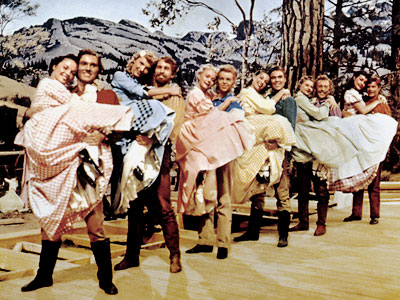
When
Bitch Flicks first put out the call for a review of the movie musical landscape, this was the first movie that came to mind. It has all the elements of a great movie musical: the hummable ditties of
Kiss Me, Kate, the buoyant dance sequences of
West Side Story, and the Technicolor treatment of the great Pioneer experience of
Oklahoma! But when you add blatant misogyny, barn-raisings and male bravado, and taking women by force as the ultimate romantic gesture, you get
Seven Brides for Seven Brothers. The 1954 movie, directed by Stanley Donen (
Singin’ in the Rain) with music by Saul Chaplin and Gene de Paul and lyrics by Johnny Mercer, with choreography from the great Michael Kidd, is often overlooked when considering the movie musical genre. There are, admittedly, many musicals that enjoy examining the battle of the sexes, and most old-school romantic comedies start with a Dude™ and a Chick™ squabbling over their differences. But very few of those ever let the man be so backwards that he equates courtship and conquering, or has a woman responsible for civilizing and subduing men’s worst impulses. It’s like
Lysistrata and
The Hangover got together and held a barn dance–a big, beautiful Crayola-colored extravaganza.
In 1821, Oregon Territory, Adam Pontipee (the impossibly rugged Howard Keel) is looking to fetch himself a wife—not for the purposes of high-falutin’ romance, family, and lifelong happiness, no. “I’d like best a widow woman that ain’t afraid to work,” he says, at the general store, where he’d just as quickly pick up a mate as he would 25 pounds of chewing tobacco. “There’s seven of us men, me and my six brothers. Place is like a pigsty, and the food tastes worse….” Adam is out for marriage in the purest economical sense: in this new territory, there are ten men for every woman, and so Adam’s priority is availability, not compatibility.
“Bless Yo’ Beautiful Hide,” he booms, and it’s not until he sees Millie (Jane Powell, strong of axe and soft of heart) that he knows he can go out and buy with gusto. She makes great stew, so that’s half the battle, and she is used to tending men in a boarding house, so he considers her the perfect bride.
He offers marriage, she accepts (as she’s fallen for him on first sight), and off they go in his wagon back to his cabin in the mountains, where she meets his six red-bearded, bullish brothers. Millie bristles at caring for her brother-in-laws without some control, and so she withholds a hot breakfast and newly washed clothes until they promise to shave and settle down like gentleman. It seems that what this house has longed for is not an extra hand in the washroom, but a gentle and firm guide to proper etiquette.
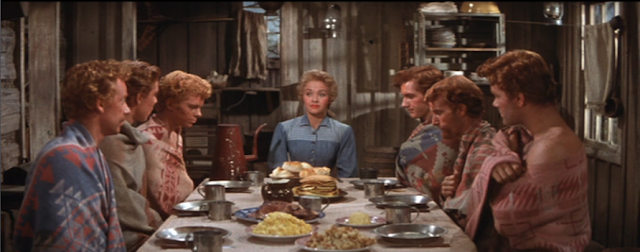
What Millie discovers, as she gets to know these boys, is that they long to go out and snatch up girls of their own—which they do, in spectacular fashion, at the town’s barn raising. The brothers Pontipee, all in primary colors, demonstrate through dazzling choreography how dashing and desirable they can be, and sweep the girls off their feet. Just watch how leapfrogging, arm wrestling, log-rolling, and balletic machismo pays off. (This is the most spectacular sequence of the movie, and it’s impossible to watch without a slaphappy grin. Jacques d’Amboise and a very young Russ Tamblyn steal the show as Ephraim and Gideon, defying gravity with every move.)
But of course, the boys get into a fistfight with the girls’ other suitors, and soon they’re back on the farm, suffering through the early days of a long winter. It’s lovely to see these men pining, something so rarely explored outside of the musical theater realm, while maintaining their rugged outdoorsmen personas. (This is, of course, expressed through the delicate art of ax ballet.)
The enlivening force of Seven Brides is male longing, and it makes for great theater. The Pontipee brothers have lived hard, but falling in love is what softens and civilizes them. But all that civilization is for nothing when Adam, modern man that he is, devises a brilliant scheme, pulled straight out of Millie’s copy of Plutarch’s Lives. Why not do like the Romans did with the Sabine women?
And then comes the merriest song about rape ever.
The brothers are shaken out of their depression by the chance to reassert their manhood, and off they go to town, snatching up their girls from backyards and front porches and carrying them off, squealing and crying. An avalanche falls as they are passing through the mountains, preventing the angry families and boyfriends from reaching the Pontipees. Millie, horrified to discover what the boys have done, reasserts her right over the house (the one territory that has become completely hers to control) and sends the boys to the barn for the entire winter, taking the girls inside and keeping them under close watch.
This ends up being a bit of a tease, since the girls get their own dance (about marriage, natch), and Millie discovers she’s pregnant. And though the girls start warming up to the brothers (peeking through windows, running around in their skivvies), the snow that blocks the pass never melts.
Once it does, we get lovely sequences of the girls and boys frolicking together with baby farm animals (no, this movie is not subtle), and Adam stays holed up in his hunting cabin, resentful of Millie’s banishment. But once he learns he has a baby—and at that, a baby girl—Adam breaks down and returns home to be the man he’s supposed to be. Though their families come to retrieve them, and the brothers are ready to set them free, the girls refuse to leave, claiming the newborn as their own. For better or for worse, we get a group marriage of a finale, and a whole bunch of color-coordinated couples once more.
So what do we make of such a strangely backwards story of frontier courtship? For one, that men, without the guiding impulses of a good woman, will behave like savages. Whether they demonstrate that savagery at the breakfast table or at a barn-raising, it’s clear that the Pontipee brothers have impulse control issues, and they just can’t help themselves. Their needs—for food, for dominance, for love—trump almost everything reasonable and refined, and they have been taught, as pioneers of this new and uncharted territory, to take when they can. Though Adam is charming and sexy as hell—seriously, George Clooney and Howard Keel could have a smirk-off—he treats Millie like a servant at best, and property at worst. “It wouldn’t hurt you to learn some manners, too.” she remarks at the barn-raising. “What for?” he counters. “I already got me a wife.”
You can argue that Millie should’ve seen this unfair exchange coming when Adam first walked into her boarding house—and she had no real incentive to get married. Gainfully employed, resourceful, well-liked and respected by her community (especially by the women), Millie could’ve easily stayed on her own in this new country. But she, too, is softened by love, and so she is the one that understands the brothers’ plight, not Adam. You can fault the captured girls a little less than Millie, at least initially—but they too get their attic ballet-in-bloomers about the dream of summer weddings. We are expected, no matter if our house or barn needs tending, to wish for a pairing-off, and the frontier certainly looks less terrifying if you are facing it alone.
But ultimately this is a movie that asks where male compassion comes from—and the last few scenes seem to conclude that it’s when sexual politics are made personal. Holding his newborn baby girl in his arms for the first time, Adam says, “I got to thinking up at the cabin, about the baby. How I’d feel if someone came creeping in and carried her off. I’d string him up the nearest tree. I’d shoot him down as I would a thieving fox.” It’s when Adam has to think about another man out there, treating his daughter like she was property just waiting to be taken, to stir him to a nobler state of mind. Just imagine if a Seven Brides scenario applied to every zealot or backwards politician who questioned a woman’s right to her own body and state of security, if all their wives and girlfriends were subjected to sexual scrutiny. We’ve be living in a very different universe—and this ain’t even Oregon territory.
Seven Brides for Seven Brothers can certainly leave you feeling ambivalent, and possibly wondering whether this lovely closing marriage sequence is a symptom of Stockholm syndrome. But what it mostly offers—spectacular dance sequences, memorable songs, and an interesting take on what it means to be “civilized” by love—makes for a rollicking good musical, and an underappreciated classic.
———-
Jessica Freeman-Slade is a writer who has written reviews for
The Rumpus,
The Millions,
The TK Review,
The Los Angeles Review of Books, and
Specter Magazine, among others. She works at Random House as a cookbook editor, and lives in Morningside Heights.


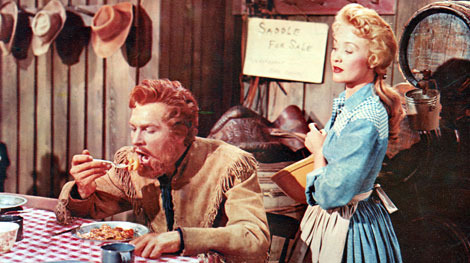

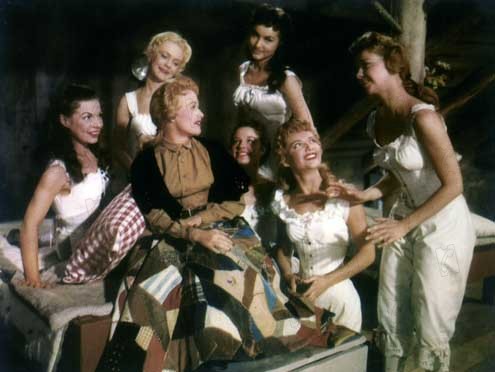

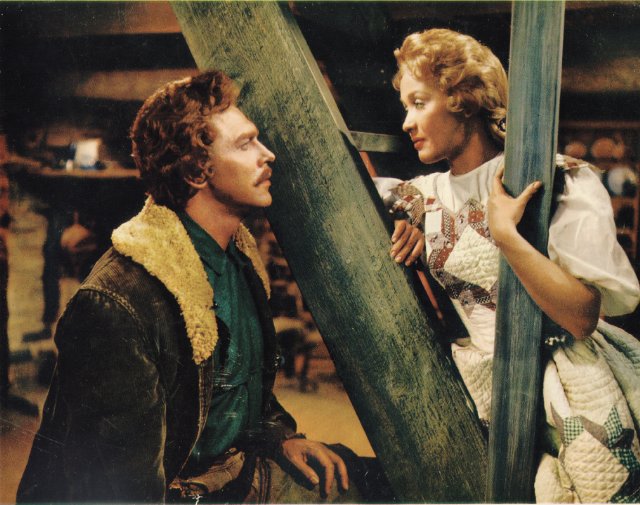

I know Seven Brides can be hugely problematic, but I’m able to overlook some of that because Adam, and the other men (Gideon most of all), realize that they were wrong and try to correct their wrongs by taking the women back home.
Contrast that with My Fair Lady, which I’ve never been able to enjoy because of the Professor’s misogyny. Despite two great songs for Eliza about standing up to him; in the end, she winds up right back with him. He hasn’t learned a darned thing, and expects her to step right back into taking care of him; and she seems ready to do that without pause.